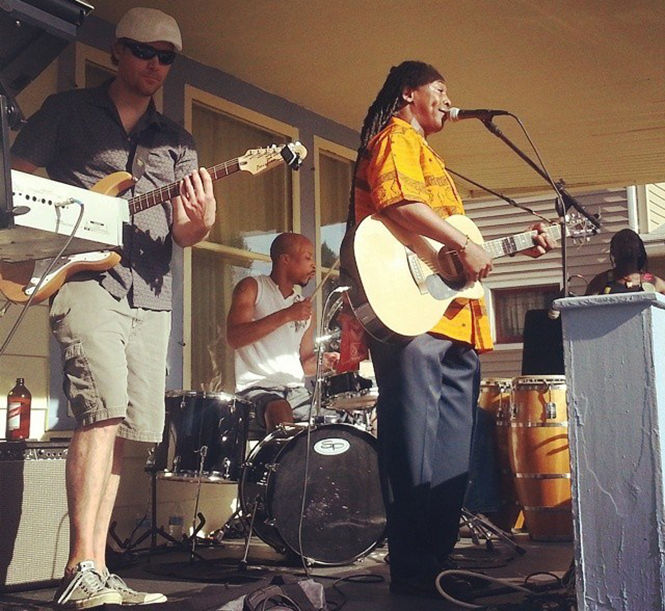A Gumbo Gala: Reggae Meltdown celebrates the many strains of Island music
Reggae music, born in the ghettos of Kingston, Jamaica during the 1960s, has always been a music of the people. From its Marley-born Rastafarian roots to its evolution into ska and seeping into punk rock, the music of the Rastafarian movement still moves on today.
According to some reggae musicians, such as Kevin Nunn, drummer and vocalist for the Rhodes Street Rude Boys, the good vibrations are moving mostly underground.
The “Rude Boys” are one of the reggae-influenced groups set to perform Friday, Nov. 14 around town at Kent’s annual Reggae Meltdown, a celebration of Jamaican roots music featuring many diverse strains of the sound. Along with Nunn’s Akron-based band, groups such as the Ark Band, Dub DJ Danny Jah, and Gato’s Gumbo Gallah are to deliver good, danceable vibes in par with Cajun sounds of the Caribbean.
Most, such as Nunn’s Rude Boys, don’t claim they are authentic — they just claim influence.
“We make no premise that we’re Jamaican,” Nunn said. “We’re just boys from Ohio playing reggae music.”
Nunn, like many budding musicians of the ska movement of the 1990s, owes it to roots reggae as a pivotal influence. Coming out of the University of Akron 20 years ago, Nunn and bandmate Walter Hayes ventured around Ohio with their punk rock outfit, well aware of bands like Reel Big Fish and Sublime. When Nunn was introduced to the Jamaican style of reggae group Mighty Lee Light and the San Croix-based Midnite, he was sold. Soon after Hayes got married and moved back to Akron, Nunn and the newly named Rude Boys found their new shtick.
Although many a musician has passed through the Rude Boys’s lineup, their sound has remained somewhat constant throughout the years. Songs like “Forward” and “Come Back Lion” mix up the typical skank, staccato guitar with rolling bass, along with the socially-aware lyrics a part of the reggae gospel. Although the four-piece Rude Boys claims a harder sound that the common Island-influenced group, Nunn said their “different take on reggae” still abides to it’s inherent crowd-appealing ethos.
Even if that means it’s rebel music.
“I think that all reggae music should make you feel a little bit uncomfortable, just like how rock music should make you feel a little uncomfortable,” Nunn said.
Along with fellow Meltdown bands Tropedelic and Crucial 420, the Rude Boys are well versed in local reggae rock scenes, including those of Cleveland, Akron and Columbus. The infectious sounds of primitive Kingston music, Nunn said, is much alive in local circles, many who don’t manage today, when pop reggae artists like Slightly Stoopid and SOJA light up the charts, Nunn believes that most of the Marley-esque music flows under the ocean of the “politically correct” mainstream.
Far from the sights of the today’s flourishing reggae scenes in California and New York are the music of the Gallah people of the Carolinas, where Ras Gato, the leader of the Gato’s Gallah Gumbo marks his roots. Gato, whose mother’s lineage extends back to the Ethiopian people who inhabited the South Carolina coast, recalls the “iron rhythms” and the Afro beat that would become popular in the Caribbean as “Island music.”
For Gato, along with his brother Dpontoes, the meaning of “roots” music — the same found in Marley’s Kingston scene — is simply what reggae is when played directly for the people, leaving out any “manufactured” superfluities others may use.
“When I think of roots music, I think of live music,” Gato said. “Which is different than showing up with a CD. The ‘live’ part of the music is the heart (of it.)”
The Gatos Gallah Gumbo formed in 2010, when Gato worked as a DJ for Cleveland’s WCSB, where he played, he said, a great mix of reggae styles from around the world. After a divorce and then relocation, Gato partnered together with his brother to form their current collective, which — like many reggae groups — has welcomed many members throughout the years. Gato said adding the influences of Bootsy Collins, Jimi Hendrix and James Brown to the mix expresses just another element of the funk he and his bandmate grew up with. He’s even readied a reggae version of Hendrix’s “The Wind Cries Mary.”
But those treading far from a pure, Jamaican music don’t seem to fret Gato, as he claims that the music of the Islands or the Gallah people inevitably finds its way into the many diverse strains of reggae. Messages of Rastafarian origin, of peace and love, he said, are “subconsciously” heard under the music — whether out of those claiming Island heritage or not.
This said, Gato still meditates repeatedly on the roots of the Gullah sound.
“It’s something that, I believe, has to be celebrated,” he said.
What excites Nunn and others about festivals like the Meltdown is that face that it is a celebration of where reggae has been and where it is going. This diversity is what warms Nunn’s heart as a musician, that it’s, historically, a music for the people.
“With reggae music, I should be able to stand next to a college student and a person from down the street,” Nunn said. “You can say it makes me feel comfortable when all types of people are together.”
Contact Mark Oprea at [email protected].


